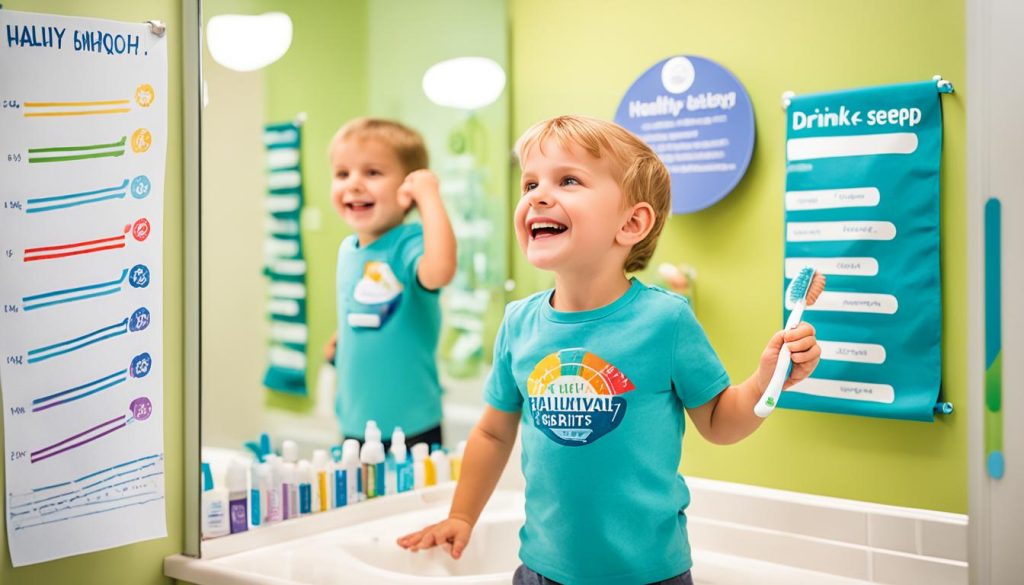Seeing your child struggle with schoolwork can be tough. The frustration and sighs of defeat are hard to ignore. Many parents face the challenge of helping their kids through tough times in school. But, research shows that parental involvement can really help kids do better and feel more positive about learning. You play a big role, and with the right approach, you can help your child grow and learn from these challenges.
There are many ways to support your child’s learning. You can understand what’s causing their struggles, create a supportive home, and use school resources. This guide will show you effective parenting strategies for education. You’ll learn how to help your child overcome any academic hurdles.
Key Takeaways
- Parental involvement significantly boosts children’s academic performance.
- Understanding learning and focus issues is crucial in addressing academic struggles.
- Creating a conducive study environment and consistent routines helps children thrive.
- Utilizing positive reinforcement can motivate children and enhance their love for learning.
- Effective communication with teachers and utilizing school resources are essential strategies for support.
Understanding Why Your Child May Struggle Academically
Children may struggle in school for many reasons, each one different for them. It’s important to find out why they struggle to help them. By talking and working together, you can understand and help your child’s challenges. This helps them grow and do well overall.

Learning or Focus Issues
Learning problems and ADHD can really affect a child’s school work. Kids with these issues have trouble focusing, finishing tasks, or learning new things. It’s key to spot and help them early, like with tutors or therapists. With the right help, they can get better and reach their goals.
Organizational Skills
Not being good at organizing can make school hard for a child. They might not keep up with homework, manage time well, or keep their study area tidy. Teaching them how to organize early on helps them be more independent and do better in school. Things like planners and special study spots can really help.
Physical and Emotional Health
Health problems, like asthma, and feelings of anxiety or depression, can make it hard for a child to focus and do well in school. It’s important to keep your child healthy and get them the right medical and emotional support. Regular doctor visits and talking about how they feel can help spot and fix these issues.
Social Factors
Social stuff at school is also important for a child’s learning. Things like bullying or feeling left out can make school hard. It’s good to listen to your child about what’s going on at school. Work with teachers and school staff to help them with social problems. This makes school a better place for them to learn and grow.
These factors help us understand why some kids have trouble in school. Taking action and supporting them can help them do better and succeed.
Utilizing Positive Parenting Techniques
Positive Parenting creates a caring and supportive space for kids to grow. It’s all about positive talks and feeling close. This helps kids become strong and flexible, especially when they face school challenges. Using these methods boosts their emotional smarts and self-confidence, setting them up for a happy life.
Building Self-Esteem in Children
Building Self-Esteem in Children starts with praising their efforts and wins. It’s key to make them feel important and supported. Simple actions like saying “Great job!” or listening to them can really help their self-esteem.

Effective Discipline Strategies
Good discipline teaches kids about right and wrong in a kind way. It means setting clear rules and sticking to them. Methods like time-outs and positive feedback help kids learn to behave better. Studies show these methods lead to better behavior and emotional health.
Fostering Emotional Intelligence in Children
Teaching kids to understand and manage their feelings is vital. Techniques from The Gottman Institute, like emotion coaching, really work. This 5-step program can make kids 79% better at being positive and happy. By being kind and helping them through tough feelings, parents can boost their emotional smarts.
Role of Consistent Routines and Healthy Habits
Creating healthy habits in kids through consistent routines is key for their school success. These routines give kids a sense of security and stability. This greatly affects their physical and emotional health.

Routines are a big part of a child’s life. They make kids feel safe, like they belong, and help them handle big changes better. This is important when moving or getting a new sibling. Routines help kids deal with these changes, making them feel less anxious and sad.
Having schedules for homework, rest, and sleep is crucial. The Importance of Sleep for Kids is huge. Regular bedtime routines boost their mental health and thinking skills. Kids need lots of sleep to do well in school.
A balanced diet is also key. Good Child Nutrition and Development affects their focus, energy, and school work. Eating meals together without screens helps families connect and teaches kids good eating habits.
For young kids, doing things like brushing teeth and washing hands becomes easier with routines. These habits keep them healthy and help them stay focused on schoolwork.
Older kids and teens benefit from routines too. They learn to be responsible and manage their time well, which is important for school. Morning and after-school routines help them stay organized and do well in school.
Family routines are also important. Doing things like going for walks, shopping, or visiting museums together strengthens family ties. These activities have a big impact on kids’ growth, more than distracted or hit-or-miss attention.
The following table shows how routines help kids:
| Aspect | Benefits |
|---|---|
| Safety & Belonging | Creates a secure feeling, reduces anxiety |
| Health | Promotes better hygiene, reduces illness |
| Mental Health | Improves self-regulation, lowers stress |
| Academic Performance | Boosts focus, concentration, and time management |
| Family Bonds | Strengthens relationships, promotes positive interactions |
Healthy habits in kids come from structured routines. These routines help kids manage stress and support their growth. This leads to better school performance and family life.
Supporting Your Child Through Parent-Child Communication
Talking well with your child is key to helping them through tough times at school. By listening actively and talking openly, you make a safe space for them to share their school worries. This part will share tips to make your talks better and strengthen your bond.
Active Listening Techniques
Being an active listener is vital in Parent-Child Communication. It’s not just about hearing words; it’s about really connecting with your child’s feelings and thoughts. Here are some ways to do it:
- Maintain Eye Contact: This shows you’re really interested in what they’re saying.
- Avoid Interrupting: Let them finish their thoughts before you respond.
- Reflective Listening: Repeat back what they said to make sure you get it.
- Ask Open-Ended Questions: These questions lead to deeper talks. For example, “How did you feel about that?”
- Show Empathy: Accept their feelings, even if you don’t agree with them.
Using these Active Listening Techniques makes your child feel heard and valued. This builds a stronger relationship and helps them do better in school.
Creating an Open Dialogue
Talking openly and often is key to a strong bond with your child. Studies show that kids who feel loved and accepted talk more about their feelings and worries.
Here are some important points to remember:
- Be Accepting and Non-Judgmental: Show you accept your child’s feelings without criticizing them right away.
- Tune In to Their Emotions: Recognize and acknowledge their feelings to make them feel understood.
- Quality Time: Spend time together without interruptions. It can be as simple as playing a game or going for a walk.
- Allow Them to Lead: Let your child guide the conversation to boost their confidence and sense of control.
- Consistent Check-Ins: Regularly talk about their day-to-day life.

By using these methods, your Parent-Child Communication will improve. This leads to a deeper understanding and a stronger bond that helps your child succeed in school.
| Technique | Benefit |
|---|---|
| Maintaining Eye Contact | Shows genuine interest |
| Reflective Listening | Confirms understanding |
| Open-Ended Questions | Encourages deeper conversation |
| Quality Time | Enhances bonding |
| Empathy | Validates feelings |
| Allowing Them to Lead | Builds confidence |
How to Collaborate with Teachers and School Staff
Working together with teachers and school staff is key to teaching kids responsibility. It helps tackle academic and social challenges. Good communication and teamwork can make a big difference in your child’s school life.
Regular Meetings with Teachers
Meeting with teachers often is crucial. Talking face-to-face, like during conferences, home visits, or phone calls, is the best way to connect with schools. These chats let you share updates and insights about your child’s progress and needs.
Recent stats show that positive phone calls from teachers boost school-home talks. Surprising parents with good news about their kids can make the parent-school bond stronger.
Starting contact early in the school year and keeping up with regular meetings helps teachers and parents be on the same page. This way, issues like bullying can be tackled early and small problems don’t get bigger.
Utilizing School Resources
Schools have many resources to help students and families. Using these resources is a big plus. They offer newsletters, open houses, curriculum nights, and home visits. These activities create a team effort for your child’s success.
The Family Engagement Framework and IDEA highlight how important parents are involved. Schools should tell parents about the resources available and how to use them well. Keeping parents updated on their child’s grades and homework is also key. Schools do better when they communicate clearly and on time with parents.
Addressing Bullying Issues
Stopping bullying needs a team effort from parents, teachers, and school staff. Keeping open lines of communication between parents and teachers is crucial. Catching bullying early can stop it from harming your child’s school and social life.
- Teachers and parents must stay alert for any bullying signs.
- Regular updates help report and fix bullying quickly.
- Creating a welcoming school where kids feel safe to speak up is essential.
Working with teachers and using school resources are great ways to help your child grow. Keeping in touch often and taking action against bullying makes for a safe, supportive school environment.
| Strategy | Effectiveness |
|---|---|
| Personal Meetings | High |
| Positive Phone Calls | High |
| Timely Communication | Very High |
When to Seek Professional Help
It’s key for parents to know when to get help for their child’s school and mental health. If your child keeps struggling in school or shows odd behaviors, it might mean they need help from experts.
Consulting Healthcare Providers
Talking to healthcare providers is a good first step for your child’s mental and behavioral issues. If you notice strange behaviors, a chat with a pediatrician could lead to advice on finding experts. These experts can create plans to help your child.
Exploring Psychological Support
Looking into psychological support is vital for your child’s mental health. Conditions like ADHD, anxiety, and depression can hurt a child’s school work. Early help, custom plans, and regular checks can really help. This way, you can see if your child is getting the right support.
Considering Educational Therapists
Educational therapists offer special help for kids with learning issues. They create learning plans just for your child to boost their school success. Grandparents, who are key in supporting their grandkids’ education (more info here), can also help your child do well.
Incorporating Positive Reinforcement Strategies
Positive Reinforcement Parenting is a great way to encourage and motivate kids. It shows that being positive helps kids behave better. They learn to share, follow directions, and do chores because they want to.
Regular positive reinforcement shapes kids to be kind, work together, and help out. Giving them praise is a simple but strong way to do this. It makes the bond between parents and kids stronger and more loving.
Using things like stickers or more playtime can really motivate kids. This makes them want to keep going and love learning more. Giving them special privileges like more screen time or picking a family activity can also work well.
| Type of Reinforcement | Description | Benefits |
|---|---|---|
| Verbal Praise | Simple, consistent verbal acknowledgments of good behavior. | Boosts confidence and self-esteem. |
| Physical Affection | Hugs, high-fives, and other physical gestures. | Strengthens emotional bonds and shows appreciation. |
| Tangible Rewards | Stickers, extra playtime, small toys. | Immediate motivation and visual progress tracking. |
| Privileges | Extra screen time, choosing a family activity. | Direct link to positive behavior, promotes engagement. |
It’s important to be consistent with rewards and incentives. This helps kids see how their actions lead to good results. Giving rewards right away after they behave well helps them understand this better.
For more tips on creating a caring environment and supporting mental health, check out supporting your child’s mental health.
When you clearly state what behaviors you want to encourage and let kids pick their rewards, they get more excited. This approach helps them love learning and being creative. Mixing rewards with their own reasons for doing things boosts their positive growth over time.
Positive Reinforcement Parenting works better than punishing kids. Being consistent, encouraging, and kind helps create a peaceful and caring home.
Balancing Screen Time and Study Time
Parenting today is tough, especially with the rise of digital devices. It’s key to set limits on screen time and make sure kids have enough time for studying. This balance is crucial for their growth.
Setting Boundaries with Kids
It’s vital to have clear rules about screen use. The American Academy of Pediatrics suggests limiting media for kids aged 2 to 5 to one hour a day. They also advise no media for kids under 18 months. Creating tech-free zones or times, like during meals or one evening a week, encourages more playtime without screens.
Keep screens out of bedrooms and turn off background TV to create a healthier space. Encouraging kids to do physical activities and hobbies outside of screen time helps them develop a balanced lifestyle.
Managing Screen Time Effectively
Watching how much time kids spend on screens is key to avoid too much screen time. Studies show a link between screen time, sleep, and how well kids do in school. Setting limits on daily or weekly screen time can lessen the negative effects on their minds and feelings.
Don’t let kids use media during homework to avoid distractions. Parental guidance on media use can lead to fewer problems, like aggression, substance use, and risky behavior. Teaching kids how to behave online is crucial to stop cyberbullying, sexting, and sharing too much personal info.
| Age Group | Recommended Screen Time | Guidelines |
|---|---|---|
| 0-18 months | Discourage, except video chatting | Foster direct human interaction |
| 2-5 years | 1 hour/day | Focus on high-quality programming |
| School-aged children | Set daily/weekly limits | Avoid media during homework, monitor usage |
| Adolescents | Enforce limits and curfews | Teach digital responsibility |
By balancing screen time and study time, and setting the right limits, parents can better navigate today’s digital world. These steps can improve your child’s school performance and overall health.
Encouraging Healthy Study Habits
Setting up your child for success means teaching them good study habits. These habits are key for doing well in school and growing as a person.
Creating a Conducive Study Environment
It’s important to make a study space that helps your child learn. This means keeping distractions away so they can focus. Studies show that kids do better when they have a special place for studying.
Letting them make their study area their own can make it more inviting. Keeping the space tidy is also crucial. Clutter can distract and lower focus.
Developing a Homework Routine
Having a regular homework routine is key. Setting aside specific times for homework teaches time management skills. These skills are useful in school and later in life.
Helping your child with their homework without doing it for them is good. It builds their confidence and sense of achievement. A “When-Then” routine can make homework part of everyday life, not a burden.
Using Study Aids and Tools
Using different study aids and tools can make learning fun and interactive. Apps, flashcards, and hands-on tools help kids understand tough topics better.
Teaching kids that failure is a chance to learn makes them more resilient. Working with friends on homework can also help them stay on track with their studies.
By using these methods every day, you can help your child learn for life. This prepares them for success in the future.
Conclusion
Supporting your child’s academic journey means using positive parenting, setting routines, and talking well. By using science and practical tips, you can make a place that helps your child do well in school and feel good. It’s not just about helping with homework; it’s about making a supportive space for your child to grow independent, confident, and love learning. Parenting advice says to be supportive, caring, and open. These are key to raising kind kids who respect and understand others.
Parenting greatly affects how children grow, showing that kids learn from their moms and grandmas. Research also points out that genes play a big role in shaping behavior. Traits like being careful and friendly come from parents and their care. This means being active and caring in parenting can help your child do better in school and feel emotionally healthy.
Teaching good study habits, managing screen time, and getting help when needed are important for a caring home. Regular talks and emotional checks help prepare kids for school and life. Teaching values like respect and empathy gives your child the skills to handle school challenges and live a full life.
FAQ
How can I support my child through academic challenges?
Why might my child struggle academically?
How can I build my child’s self-esteem and emotional intelligence?
What positive reinforcement strategies can motivate my child?
How do consistent routines and healthy habits improve academic performance?
What are some effective parent-child communication techniques?
How do I collaborate with teachers and school staff to support my child?
When should I seek professional help for my child’s academic issues?
How can I manage and set limits on my child’s screen time?
What strategies can encourage healthy study habits in my child?
This post contains affiliate links. If you click on a link and make a purchase, I may earn a small commission — at no extra cost to you. Thank you for supporting this blog and helping me keep the patterns free! Read the full Affiliate Disclosure & Transparency.
